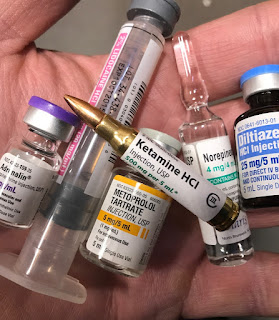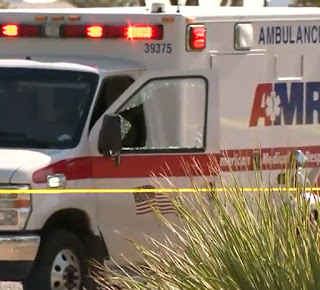1a : assured reliance on the character, ability, strength, or truth of someone or something
It can be heard in just about every EMT class: that cliché statement “it might be your 1000th 9-1-1 call, but for your patient it may be the first.” That sentiment is easily appreciated by blooming providers because in most cases every call they take is a first. First fall. First code. First head-on MVC. Then comes the first med-seeker. Then another. The first of many repeat-caller psychiatric patients. After a time the slings and arrows take their toll on many providers and compassion fatigue begins to set in. PTSD, substance abuse, and even suicide can follow for some. Yes, we change. Our views change. Our expectations change, and sometimes our very values change. EMS tests us all physically and mentally and invariably warps us - to what degree largely depends on the individual.
The cliché, however, stubbornly retains its validity. This indeed might be your 1000th or 5000th or even 10,000th 9-1-1 call. Yet the caller may be summoning EMS for the first time in her life. And that caller is doing more than calling an ambulance; she is placing her TRUST in EMS - relying on our character, ability, strength, and truth. She is inviting us into her home without the time to clean or take a shower. She’s surrendering her modesty to our physical exam. Ultimately she is hoping that we are going to be medically proficient, respectful, and kind. It’s a trust that many of us can’t fully appreciate, and because of that fact we EMS providers can forget what that trust means to our relationship with our communities.
Everyone should by now have heard of the Washington firefighters who practiced intubations on a recently deceased patient. On top of that, this week a Virginia EMT came under very public scrutiny when it was discovered that he made
racist statements about black patients during a white supremacist podcast which he co-hosts. Those are two high-profile examples of trust betrayed by EMS - two examples among many other examples which, although not as egregious, occur in this business every day.
Some readers will perhaps be angered by my assertion that EMS and not just these specific individuals is responsible for that betrayal. I sincerely hope everyone IS angered because EMS is learning, as nurses did long ago, that anyone with the title speaks for the whole of the group. Law Enforcement is learning this as well and many fine men and women have needlessly lost their lives because of it.
You see, it’s not enough anymore to stand in the background with a disapproving frown and a polished pair of boots, righteously murmuring “Yes- that guy is a jerk, but he doesn’t speak for me!” If ‘that guy’ wears a Star of Life, like it or not he does speak for you. He speaks for me, too. This is the first lesson of EMS leadership and stewardship: everybody who wears a uniform is on our team, and both in word and in deed they represent us. Ignorance, intolerance, and incompetence are much like ventricular fibrillation: simply recognizing it isn’t fixing it. If we don’t quickly and decisively remedy it, it’s always fatal and a lack of professionalism and universal compassion in EMS is V-fib for any public trust we have earned.
Desecration of a body and hate speech are not things that promote trust in EMTs and Paramedics, regardless of ridiculous excuses like “We’ve always done that” and “It’s my First Amendment right.” Every EMS provider should be publicly decrying the incredible breach of trust that is intubation practice on someone's newly decased father. We should all be taking to social media to proclaim “Alex McNabb is an ignorant jackass and has no business in our ranks when he talks about frightening and hurting black children with large-gauge angios.” Furthermore, beyond these widely publicized events, every EMS provider should make a daily habit of looking and acting like a professional, keeping her skills and knowledge sharp and up to date, and calling out those in her cohort for failing to do the same.
We cannot keep silent or turn a blind eye when our colleagues are poor ambassadors. These people do speak for us, and any failure on our part to condemn poor performance only enables it. As we push ever so slowly towards respect and salary parity with nurses, firefighters and other professionals, we cannot afford to lose the trust of the people we serve. We’d be wise to take ownership of the industry’s public image, and strive to police ourselves. Trust, once betrayed, is rarely recovered.



It was really insightful.
ReplyDeleteThanks for such a nice content.
Cheers
BTW if anyone interested more have a look Check Details thanks